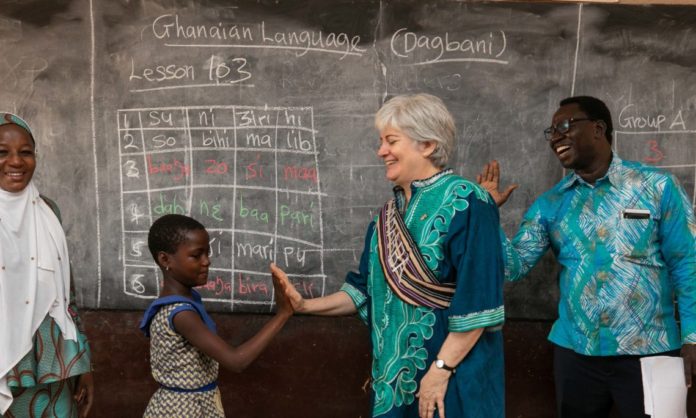Byline: U.S. Ambassador to Ghana, Stephanie S. Sullivan
It’s back to school time for many in Ghana and the United States! As a former teacher, I’d like to take a moment to share the many ways the United States and Ghana work together to improve education for Ghanaians at all levels, from primary education through higher learning.
The United States, through the United States Agency for International Development (USAID), is supporting Ghana’s Ministry of Education and the Ghana Education Service to improve learning achievement for children attending public primary schools with a focus on reading (in English and the 11 official national languages of instruction), math instruction, school management, and accountability. USAID Learning, a six-year $76 million program, is the flagship project of the United States government’s support to children attending basic school in Ghana.
During the 2017-2019 academic years, over 7,200 schools in 100 districts implemented this program throughout all sixteen regions of Ghana. Over 700,000 KG2, and Primary 1 and 2 students benefited from the project, and 38,000 teachers received high-quality instructional materials and training in innovative reading instruction methodology. The results? Significantly improved reading test scores in Ghanaian languages and English for children in project schools, with the top 25% of students in USAID Learning-supported schools reading 20 more words per minute than students in comparison schools.
At the secondary education level, the U.S. Embassy offers exchange programs for both teachers and students who have demonstrated excellent academic and leadership skills. The Kennedy-Lugar Youth Exchange and Study (YES) program offers a full academic year in an American public high school and a host family homestay. Since 2006, over 300 Ghanaian SHS students from every region have participated in the YES program. I love meeting Ghanaian YES participants, who are like “young ambassadors” in that they share their culture with American host families, schools, and communities – and when they come back, they share their experiences in America with their Ghanaian friends.
For teachers at the secondary level, both the Fulbright Teaching Excellence and Achievement (TEA) and the International Leaders in Education Program (ILEP) programs provide secondary school teachers with unique opportunities to develop expertise in their subject areas, enhance their teaching skills, and increase their knowledge about the United States.
Through various U.S. Fulbright programs, students and faculty from both American and Ghanaian higher learning institutions have been able to establish and deepen relationships among academic institutions. For example, a recent Fulbright Scholar in the Industrial Arts Department at KNUST created a partnership in which two ceramics students from the University of Arkansas attended KNUST, and a Ghanaian student attended the University of Arkansas’ Master of Fine Arts program.
The U.S. Embassy conservatively estimates that over 100 of these types of partnerships exist among American and Ghanaian universities, largely due to the personal connections, reflecting our close bilateral and people-to-people ties.
For Ghanaian students who have successfully completed SHS or already have a degree, I encourage you to consider an undergraduate or graduate degree program in the United States. American colleges and universities take pride in providing intellectually stimulating and safe environments for all their students, and I assure you that universities and colleges in the United States are eager to welcome Ghanaian students.
The U.S. Embassy in Ghana is proud that over 3,200 Ghanaian students studied at 630 U.S. colleges and universities in the 2018-19 academic year, making Ghana the third-highest sender of students from sub-Saharan Africa to the United States, after Kenya and Nigeria. We would be delighted to see those numbers increase!
If you are interested in studying in the United States, I invite you join us for the EducationUSA College Fair on Friday, September 27, 2019 at Presec Legon from 11:00am – 4:00pm, where you can meet with representatives from 50 U.S. colleges and universities. In the 2018-2019 application year, our EducationUSA advisors helped thousands of Ghanaian students apply to universities and colleges in the United States, securing admissions across the more than 4700 accredited institutions of higher learning, and facilitating $7 million in financial aid and scholarships. If you cannot attend the fair, you can reach our EducationUSA advisors for more information via: gh.usembassy.gov/education-culture/.
We look forward to continuing our partnership for education with Ghana. A robust economy in Ghana depends on much more than its natural wealth and resources. We know that basic skills like reading, writing, and math are pre-conditions to equitable economic growth, improving critical health indicators, gender equality, and socio-economic progress. Indeed, a prosperous and stable Ghana is both good for Ghana and good for the United States – and it all starts with education.
Source : U.S. Embassy in Ghana



